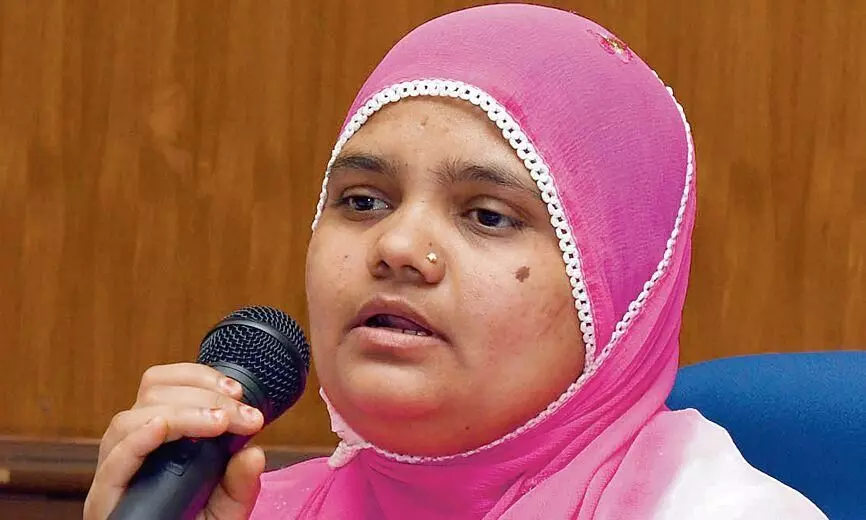
A glimmer of hope from the Supreme Court
text_fieldsThe Supreme Court's order setting aside the Gujarat government's decision to grant remission to the 11 convicts sentenced to life imprisonment in the Bilkis Banu case, who committed the crimes of the mass rape and murder during the 2002 Gujarat pogrom, will cheer those who want the justice system to remain intact. The decision taken by the bench comprising Justices B.V. Nagarathna and Ujjal Bhuya is a consolation that there is some shred of justice left amidst the iniquities by hose who flourish by throwing away all the standards of justice and all the principles of equality. Bilkis Banu, a brave warrior of Indian womanhood who rose from being raped and thrown to death by assailants during the 2002 communal riots when Narendra Modi was the Chief Minister of Gujarat, fought for justice in this legal battle. With lawyers, human rights activists, and politicians rallying behind her, the case became one of a kind in the history of Indian justice. In the Supreme Court verdict, it has been clarified that neither the Gujarat government nor the Gujarat court has the authority to release the convicts and only Maharashtra, which tried the case and gave the verdict, has the authority to do so. Moreover, the verdict also highlighted that the convicts got the verdict they wanted, of being released from jail, by presenting false information to mislead the court.
Also read: Centre, Gujarat govt must apologise to Bilkis Bano: Owaisi on SC ruling
During the days of the genocide, Bilkis Banu, who was only 21 years old and was five months pregnant, had to watch cruel monsters murder her three-year-old daughter by smashing her head on stone. 14 people including seven of her family were killed there. Following the plea of the victims, the case was moved from the court in Gujarat where the incident took place to Maharashtra. In 2008, the trial court sentenced 11 accused to life imprisonment. The judgment was upheld by the Bombay High Court in 2017. Two years later, the Supreme Court also ordered the Gujarat government to pay Rs 50 lakh as compensation, a house, and a government job to Bilkis Banu. After 15 years, one of the convicts approached the Gujarat High Court seeking a remission of the sentence, but it was rejected on the grounds that it was outside the court's jurisdiction. The petitioners then approached the Supreme Court to examine the case and get the judgment of the apex court by misrepresenting the facts according to the provisions of that time. The judgment given by the Supreme Court, based on facts placed before it, ruled that the Gujarat High Court had to deal with it, but that judgment has now been declared invalid because it was based on the false statements and facts given by the defendants with malicious intent to mislead.
Also read: Some prisoners more privileged: SC remarks on Bilkis Bano case
The Supreme Court has answered four main items of merit that came up before the bench. First, this case can be heard by the court under Article 32 of the Constitution. Second, the contention that the public interest petitioners have no locus standi in the case. Since the victim herself has filed the petition making the question one of mere academic interest. Thirdly, it was also found that the Government of Gujarat had no jurisdiction to entertain the plea for leniency. The fourth issue was whether the commutation was lawful. The court held that this issue alone would be sufficient to quash the decision of remission, but the court considered them in the interest of completeness. The defence lawyers argued that punishment should also serve as a means of reformatory change and if the convict feels remorseful, any punishment should serve as reformation and convict should given an opportunity to do so. No sign of remorse was visible in the behavior or actions of the offenders; they didn't even pay the fine they were supposed to pay to the victims.
Aso read: Bilkis Bano case: SC quashes Gujarat govt’s remission order for 11 convicts
Paradoxically, the Gujarat High Court verdict granting remission to the convicts came on the occasion of the 75th anniversary of Independence. It was even more ridiculous that the BJP government in Gujarat shocked the country by taking a stand in favor of the criminals with alacrity. The strange act of the Sangh Parivar leaders who garlanded the criminals when they came out of the jail was a literal confirmation of the court's observation that there was no mercy towards the victims. With this judgment, the Supreme Court has sent out a message that Indian judiciary will stand with the victims and for justice. Even more inspiring is is the rise of Bilkis Banu as a shining example of determination and woman power.






